Civilians At War: White Army Mobilizes As Machar Aims For Oil Fields In South Sudan
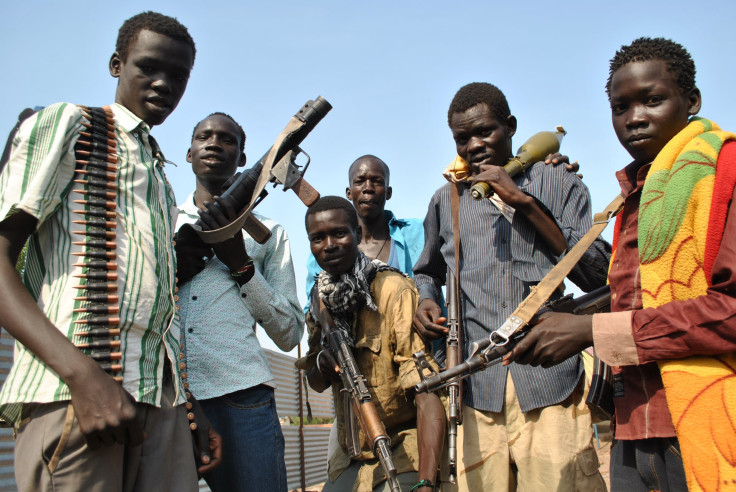
NASIR, South Sudan -- As the empty boat approaches the shore of the Sobat River, a waiting crowd grows increasingly boisterous. Rainy season is approaching, but on this Wednesday afternoon in late March, the sun is beating down on hundreds of young men who stand, armed and expectant, on a stretch of sand between the Nasir County commissioner's office and the fish market. According to agreements signed by delegates in Ethiopia two months ago, a cessation of hostilities should be in effect all across South Sudan.
But this riverboat is heading off to war, and the men race to clamber aboard as the vessel pulls ashore. In the hull, passengers elbow each other for space as more men rush in. When I point my camera toward them, they raise their guns and smile. One man dives into the boat headfirst, his feet wavering momentarily in the air as laughing friends pull him in. Brothers, uncles, fathers and cousins wave goodbye from the riverbank. If anyone is afraid of what lies ahead, no one is showing it.
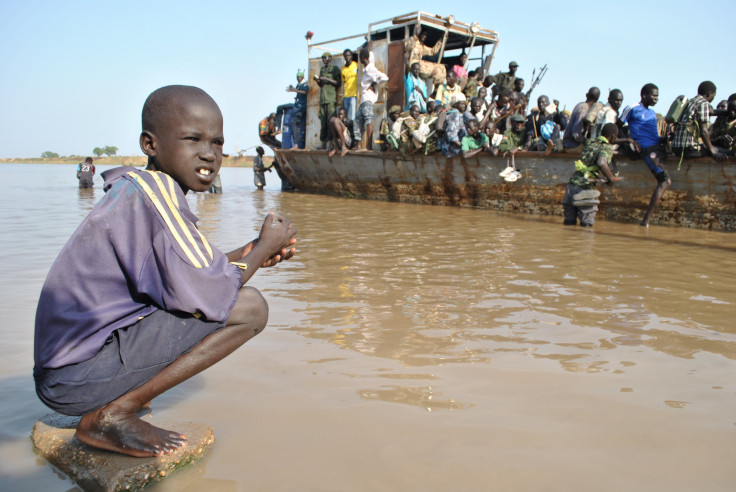
The men with guns are members of the White Army, a ragtag civilian force fighting for the South Sudanese opposition. They're launching a new offensive to take the oil fields of Paloch, a major revenue resource for the government of South Sudan. But their reasons for fighting have little to do with economics. For them, the struggle is personal.
“My home was destroyed and three uncles were killed; they were civilians,” says Isaiah Machin Hoth, 34, a former teacher who came to Nasir from Upper Nile State capital Malakal in February. “This is what we are fighting for, because the government killed our people.”
A few hundred yards away, the boat is filling up. Hoth's friends warn him not to be late, so he slings a battered AK-47 over his shoulder and runs down to the riverbank.
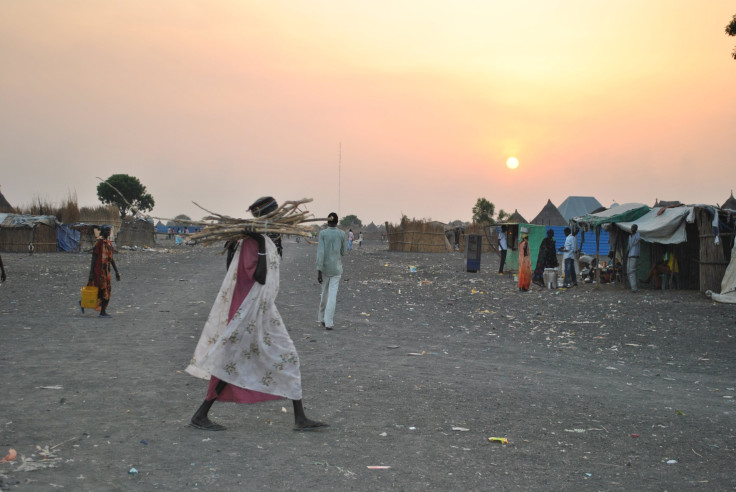
Nasir is not a flashpoint in South Sudan's conflict. It is deep in the heart of opposition-held territory and heavily dominated by the Nuer, South Sudan's second-largest ethnic group. The conflict began as a political one in the capital, Juba, with President Salva Kiir – a member of the Dinka ethnic group, Sudan's most populous – accusing former Vice President Riek Machar and his allies of plotting a coup. Nuer witnesses say the government then perpetrated a massacre against Nuer civilians in the capital city, and the clashes have since spread north and east. Thousands have died and hundreds of thousands have been displaced, especially in and around key regional capitals Malakal, Bentiu and Bor.
Machar escaped arrest in Juba and become the nominal leader of the rebellion. We meet at his quiet hideout in Upper Nile State, where he sits surrounded by a small team of bodyguards. “Because of incidents that took place in Juba, the population rose in protest,” he says. “They are big numbers -- good enough to carry the baton forward.”
In Nasir, White Army fighters are coming in from all over the state. Some fled clashes in their hometowns; others came from small villages in order to join the fight. Now they crowd the streets, alarming civil authorities with their propensity to fire celebratory gunshots into the air at all hours. They seem at home in Nasir's vibrant downtown, with a main drag lined by small shops of corrugated metal and residents greeting each other warmly at tea shops and trading posts.
But Nasir is no thriving metropolis. It is hard to fathom how a riverside town could be so dry; the ground is dust and rock, and vegetation is sparse. Save for a few key structures – including a community radio station building and a bare-bones fish market, both funded by USAID – much of the town infrastructure is dilapidated. Even the White Army headquarters is little more than a rundown concrete shelter covered with graffiti.
Maj. Gen. Gathoth Gatkuoth, the acting governor of Upper Nile State, points to Nasir as evidence that the government has failed to allocate oil revenues evenly across the country. “You see the Upper Nile State is left behind. They don't share,” he says. “So this time, we have to make sure that the oil revenue goes for public use and development.”
But before Paloch can be captured, the governor is tasked with keeping his forces in order. He has stopped in Nasir only briefly to meet with local authorities and discuss efforts to keep civilian fighters in line. “Nobody should be allowed to play and shoot their guns into the air,” he says. “We are going to make a very big move to the north. We have to tell them they should go to the front; there is no need for them to be here.”
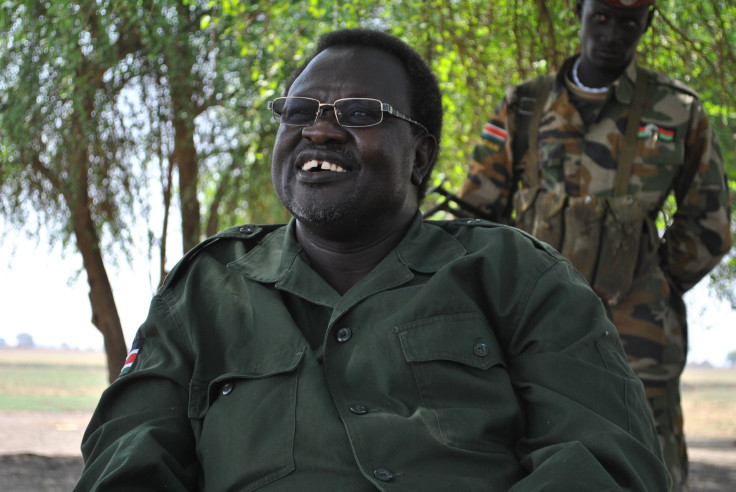
Maj. Gen. Gatkuoth says the White Army troops in Upper Nile State – he estimates they number between 60,000 and 80,000 – and defected government troops numbering up to 20,000 are under his command. He in turn reports to Machar. But fighters like Isaiah Hoth say they have their own reasons to fight. Asked whether he is going to war on Machar's behalf, he and his friends respond immediately with a chorus of "No."
Machar says his fighters have been planning to capture the Paloch oil fields for a month. “We must take control of Paloch to deny Salva Kiir the revenue to buy more arms,” he says. “After Paloch... I think he will talk.”
Upper Nile oil fields have become increasingly important: The conflict has already interrupted production in neighboring Unity State. Juba officials said in March that since fighting began in December, production has fallen by about 29 percent, down from 245,000 barrels per day to about 175,000. But government troops remain confident about their ability to protect Paloch, says military spokesman Philip Aguer from Juba. “Riek Machar has been trying since last month to penetrate the oil fields. Their attacks have been deflected; the army is still in full control,” he says. “We have enough forces protecting Paloch; they are ready to repel any attacks.”
One of the opposition's biggest weaknesses is its lack of funds. While some of the fighting is likely bankrolled by South Sudanese opposition members abroad, Machar and his fighters say that most resources come from the local communities and whatever can be taken from government troops. “We share the resources they have,” Machar explains. “They bring ammunition, we take them over. They bring guns, we take them over. They bring tanks, we capture them.”
This sort of rogue requisitioning is a White Army specialty. Almost every fighter I speak with has a story to tell about the weapons he seized from a government soldier, or the car he looted from a defeated city. These warriors, who make a point of wearing civilian clothes to the front lines, use speed and nerve to make up for their organizational deficiencies. Their main tactic is rushing, on foot and en masse, to meet government tanks and troops head on.
Both Gai, 14, is already a veteran of this conflict. He has been to Malakal twice, and the battered rifle he holds in his hands was taken from a government soldier he killed there. When I meet him, he is about to go to the front line one more time. Remembering how quickly the White Army has overrun Kiir's troops in the past, he says he is not worried that he has only 14 bullets. “That's enough, because the fighting will take less than two hours,” he says.
“But I am afraid, because people are going to fight and to die,” he adds. “I will pray for my life and for my people.”
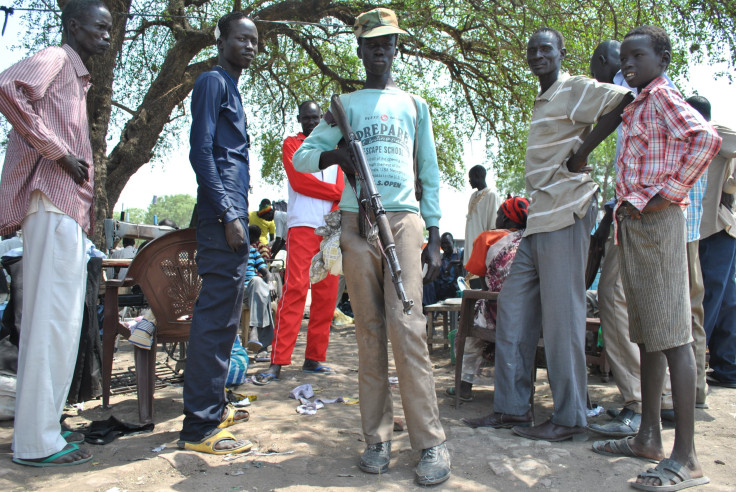
Machar says that defected government troops, not civilians, form the core of the opposition forces, acknowledging that the White Army can be a bit of a wild card. “In Juba, there’s a president who wants to wipe them out, so they fight to survive,” he says. “They are definitely difficult to control. Their discipline is wanting. We hope we will improve on that with time.”
At the heart of the matter is a clear disconnect. Civilian fighters, many of who lost family members in Juba and Malakal, say they are looking for vengeance. Their ferocity could threaten political and ethnic reconciliation in the world's youngest nation, and in the short term, their disorganization could make it difficult to seize key oil fields the government is keen to protect.
But in the battle for Paloch, it's full steam ahead. After enough White Army fighters cram into the boat on the Sobat River, its engine finally sputters to life as it makes a laborious turnaround to head back downstream. The men on board burst into jubilant war songs as the vessel creeps into the distance. Minutes later, another empty boat pulls up in its place, ready to take the next contingent.
© Copyright IBTimes 2024. All rights reserved.






















